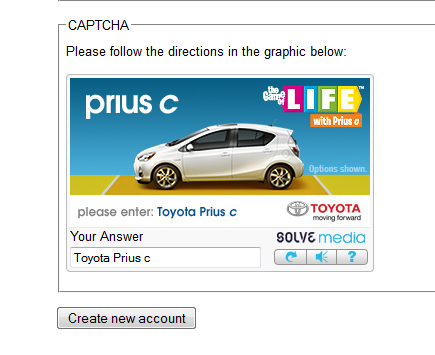Evil genius ad that uses the psychology of persuasion
 Subscribe to Decision Science News by Email (one email per week, easy unsubscribe)
Subscribe to Decision Science News by Email (one email per week, easy unsubscribe)
FAMILIARITY-LIKING EFFECTS VIA CAPTCHAS
Decision Science News was creating a new account online and had to fill out the above-pictured CAPTCHA (*) to proceed. It’s an ad and a CAPTCHA in one. It gets people to spend time and effort typing the name of the brand. [If you don’t know what a CAPTCHA is see Wikipedia, or the Official CAPTCHA Site]
That time and effort should serve the advertiser well.
Cognitive psychologists know that the longer people spend processing a thing the more likely they are to remember it. By getting you to type the name of the brand, you become more likely to remember it, which is what advertisers want.
But this manipulation does double duty. Psychologists have also uncovered the familiarity-liking effect in which repeated stimuli (e.g. songs) become liked simply for being familiar. These studies randomly assign people to various stimuli, repeat the stimuli over time, and measure liking, which tends to increase. Each subsequent impression of an ad has this effect on you, but some ad impressions go unnoticed. By getting you to type the name of the brand, you are pretty sure to notice it. [Another thing that determines whether people notice ads is the amount of time they are in view, see our recent papers on this here and here].
What’s next? Will they go after the frequency-validity effect, by which familiar statements are judged as more likely to be true? If so, the CAPTCHAs of the future will ask you to type things like “I’m going to buy a Prius C right away!”
REFERENCES
Arkes, H. R., Hackett, C. and Boehm, L. (1989), The generality of the relation between familiarity and judged validity. Journal of Behavioral Decision Making, 2, 81–94.
Bornstein, Robert F. (1989) Exposure and affect: Overview and meta-analysis of research, 1968–1987. Psychological Bulletin, 106(2), 265-289.
Hintzman, Douglas L. and Richard A. Block (1971). Retition and memory: Evidence for a multiple-trace hypothesis. Journal of Experimental Psychology, 88(3), 297-306.
(*) One of the inventors of the CAPTCHA (the original one, not this manipulative version) is John Langford, a colleague of mine at Yahoo Research.



[…] here to read the rest: CAPTCHA that uses the psychology of persuasion | Decision … April 25th, 2012 | Tags: decision-science, Frightening, inspired-captcha, new-account, Science, […]
April 25, 2012 @ 10:40 am
You might find this experiment interesting. They use CAPTCHAs to prime thoughtfulness to improve comment quality.
http://dl.acm.org/citation.cfm?doid=1978942.1979450
April 25, 2012 @ 5:30 pm
This is genius. They seem to also offer video products. Truly innovative, bravo.
April 25, 2012 @ 10:17 pm
[…] Decision Science News was creating a new account on androidcentral.com and saw this frightening / inspired captcha (*) pictured above. It's an ad and a …www.decisionsciencenews.com/…/evil-genius-ad-that-uses-the-… […]
April 26, 2012 @ 11:44 am
Full disclosure: I’ve created a new tech to replace CAPTCHAs. However, I’m not a real threat or competitor to Solve.
The theory of Solve’s ad CAPTCHAs is great, but in practice, that’s not what they deliver. You can’t run an entire campaign of CAPTCHAs and have users typing in the same tagline in each one – the spammers would eat you for breakfast.
Instead, what you get is a plain old banner ad, with a completely unrelated CAPTCHA underneath. (Just check out a site where the Solve CAPTCHA is actually in place).
I like the theory, I just don’t think this is quite the right way to implement it.
April 26, 2012 @ 12:15 pm